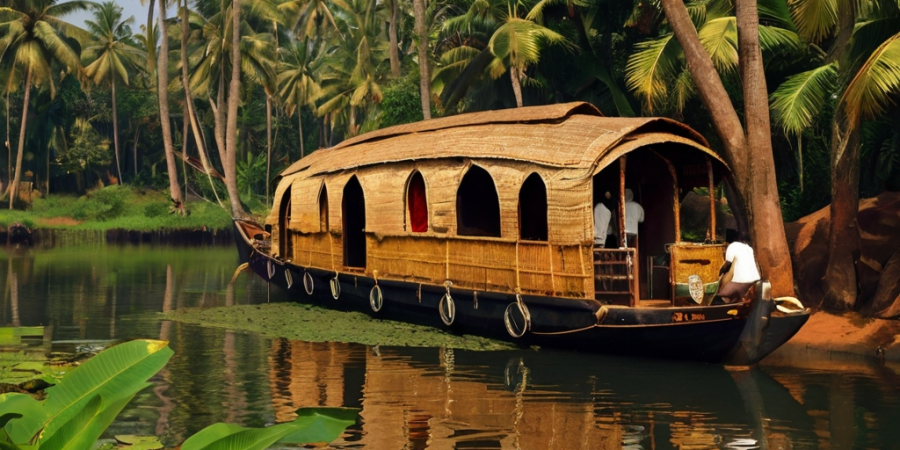

Kerala, India's southwestern jewel, boasts a remarkable blend of natural beauty, cultural richness, and progressive societal achievements. This state, often celebrated as "God's Own Country," offers an enchanting array of landscapes from verdant hills and pristine beaches to tranquil backwaters and dense forests.
Kerala is strategically located between the Arabian Sea to the west and the Western Ghats to the east. This unique positioning results in a diverse topography. The Western Ghats, a mountain range recognized as a UNESCO World Heritage Site, not only add to the scenic beauty but also play a critical role in Kerala's climate, which is predominantly tropical. The state experiences heavy monsoons, making it one of the wettest regions in India, contributing to its lush green environment.
The Kerala backwaters are a labyrinthine network of interconnected canals, rivers, lakes, and inlets, often flanked by picturesque villages. Alappuzha, often dubbed the "Venice of the East," and Kumarakom are the heartlands of backwater tourism. Traditional houseboat cruises offer an immersive experience into the serene and idyllic rural life. Besides leisure, these backwaters support a unique ecosystem and traditional occupations like fishing and coir making.
Kerala's cultural heritage is profoundly rich and diverse, shaped by centuries of trade, colonial influences, and its historical openness to various religions and cultures. Kathakali, a classical dance-drama known for its vibrant costumes and intricate makeup, and Mohiniyattam, a graceful dance form, are cultural hallmarks. Kerala's music, ranging from the classical Carnatic to folk songs, enriches its cultural tapestry. The state is also famous for its martial art, Kalaripayattu, considered one of the oldest fighting systems in existence.
Festivals in Kerala are vibrant and deeply rooted in tradition, reflecting the state's diverse religious fabric. Onam, the harvest festival, is the most famous and is celebrated with elaborate feasts, traditional games, and the iconic Vallam Kali (snake boat races). Vishu, marking the Malayalam New Year, and Thrissur Pooram, a spectacular temple festival known for its grand elephant processions and fireworks, are other major celebrations.
Kerala is a global hub for Ayurveda, an ancient system of medicine that emphasizes a holistic approach to health and wellness. The state's climate, coupled with its rich biodiversity, provides ideal conditions for the growth of medicinal plants. Numerous Ayurvedic centers and resorts offer treatments ranging from detoxification and rejuvenation therapies to more complex medical treatments, attracting wellness tourists worldwide.
Kerala's tourism is not limited to backwaters and Ayurveda. The hill stations of Munnar and Wayanad, with their tea, coffee, and spice plantations, offer stunning landscapes and cool climates. The wildlife sanctuaries and national parks, such as Periyar Tiger Reserve and Silent Valley National Park, are rich in biodiversity and provide habitats for elephants, tigers, and a plethora of bird species.
Kerala stands out for its impressive social indicators. The state's high literacy rate, close to 100%, is a testament to its robust education system and widespread access to schooling. Kerala's healthcare system is equally commendable, with excellent medical facilities and high health standards. The state's progressive policies have resulted in significant achievements in gender equality and social justice.
The economy of Kerala is diverse, with significant contributions from agriculture, tourism, and remittances. Spices, particularly black pepper and cardamom, rubber, and coconuts are major agricultural products. The coir and handloom industries also play a vital role in the state's economy. Additionally, a large number of Keralites work abroad, especially in the Gulf countries, and their remittances constitute a significant portion of the state's revenue.
Kerala's cuisine is another reflection of its rich cultural heritage. It is characterized by the use of coconut, spices, and seafood. Traditional meals, often served on banana leaves, include dishes like Sadhya, a vegetarian feast served during festivals, and various seafood delicacies like fish curry and prawn roast. The state's unique cuisine is a blend of traditional vegetarian dishes and non-vegetarian fare influenced by its coastal location.
Kerala has a rich tradition of literature, predominantly written in Malayalam. The state has produced many renowned poets, novelists, and playwrights. The Kerala Sahitya Akademi promotes literature and honors distinguished writers. The visual arts are also significant, with Kerala mural paintings, traditionally found in temples, depicting mythology and religious themes.
In conclusion, Kerala is a unique blend of natural beauty, cultural richness, and progressive social systems. Its stunning landscapes, vibrant traditions, and high quality of life make it not only an attractive tourist destination but also a model for other regions in terms of development and social progress.
4o
